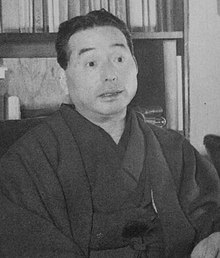Tomizo Yoshida
| Tomizo Yoshida | |
|---|---|

Dr. Tomizo Yoshida (1956)
|
|
| Born |
February 10, 1903 Asakawa, Fukushima, Japan |
| Died | April 27, 1973 (aged 70) |
| Nationality | Japanese |
| Fields |
Pathology Cancer research |
| Institutions |
Japanese Foundation for Cancer Research Sasaki Institute University of Tokyo Tohoku University Nagasaki University |
| Alma mater | Tokyo Imperial University |
| Known for | Chemical Carcinogenesis Yoshida Sarcoma |
| Notable awards |
Imperial Prize (1936 and 1953) Order of Culture (1959) Koch Medal (1963) |
Tomizo Yoshida (吉田 富三 Yoshida Tomizō?, 1903–1973) was a prominent Japanese pathologist, famous for discovering the Yoshida Sarcoma. In addition, he is known for demonstrating the chemical-induced hepatocarcinogenesis in rats with his mentor Takaoki Sasaki.
Yoshida received the Imperial Prize of the Japan Academy twice (1936 and 1953) as well as the Robert Koch Gold Medal (1963).
In the 1930s Yoshida and Sasaki showed the induction of liver cancer in rats by Ortho-Aminoazotoluene. Since that time, a large amount of data has confirmed the carcinogenic activity of Azo dyes.
In 1943, Yoshida found a cancer cell line, so-called Yoshida Sarcoma, and experimentally proved that cancer is generated from cancer cells. His findings opened the way of cancer research in terms of cells, and developed biomedical research on chemotherapy.
Yoshida was born in Asakawa, Fukushima and graduated from the Medical School, Imperial University of Tokyo in 1927. He was an assistant professor of pathology at the same institution from 1927 to 1929. In 1929 he moved to the Sasaki Institute to work on chemical-induced carcinogenesis with Takaoki Sasaki, before he went to Germany to study pathology in 1935.
...
Wikipedia
